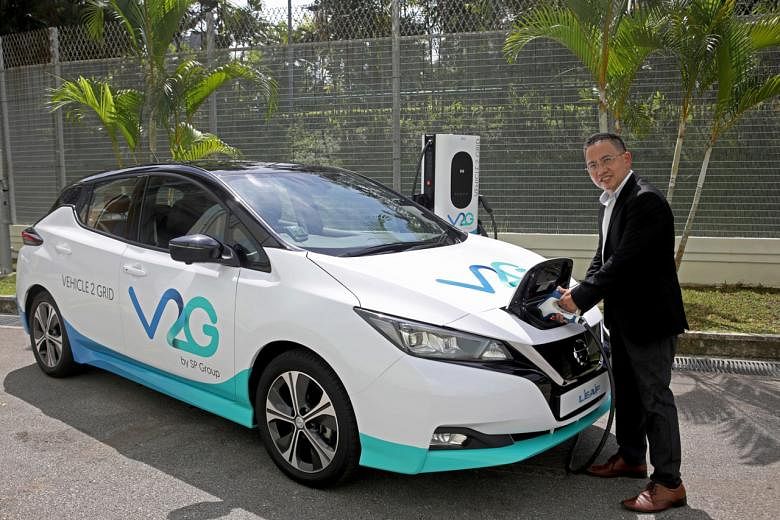SINGAPORE - Energy supplier SP Group will trial four charging points that can draw battery charge back from electric vehicles (EVs) to balance fluctuations in energy production and consumption.
SP Group said on Thursday (July 8) that the vehicle-to-grid (V2G) technology could help to enhance power grid reliability, such that the grid can handle the mass adoption of electric vehicles expected by 2040 in Singapore.
V2G can also enable Singapore's energy system to accommodate larger capacities of renewable energy, among other benefits.
SP Group has set up four charging points at one of its substations for the trial.
The trial, which is not open to the public, will be conducted with two units of the Nissan Leaf car. It will be completed in June 2022.
The Nissan Leaf is currently the only V2G-enabled model in Singapore.
SP Group said it will look into areas including EV charging during peak and off-peak periods, as well as the management of the voltage in the distribution system.
"If V2G technology is proven viable, it can be a win-win for the electricity system and EV owners, acting as a cost-effective solution to supplement the larger energy storage systems to overcome intermittency while EV owners can be paid for use of the EV batteries when needed," said SP Group.
Intermittency refers to power supply being interrupted.
SP Group said power plants have traditionally performed the role of mitigating intermittency, but EV owners can now contribute with V2G technology.
Citing the example of EV charging points powered by solar energy, SP Group said: "When solar generation drops due to rain or cloud cover, the EVs plugged into the system can balance out the fall in supply.
"During periods of significant solar generation, the EVs can store the excess energy."
SP Group chief executive Stanley Huang said the trial is another step forward to support Singapore's green energy transformation.
The Government has said it will phase out petrol vehicles by 2040. It has committed to fitting eight towns with charging points by 2025, and building 60,000 charging points around the island by 2030.
National University of Singapore transport infrastructure expert Raymond Ong said it is a good time to start trials given the expected rise in usage of EVs.
He added that the V2G system can be implemented here if people change their mentality to see each vehicle as a small energy source that can give back to the system.
"This is basically about balancing demand and supply where we may have excessive demand in power at certain periods and where power is under-utilised," he said.
But Dr Ong noted that one challenge will be to determine a pricing structure that can attract sufficient EV drivers to return energy back to the power grid.
"There are also differentiated needs that have to be considered. For example, the needs of a private car owner are different from a taxi driver or a transport fleet operator," he added.


